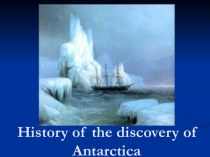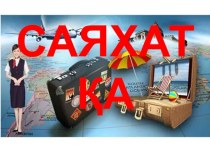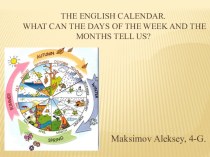- Главная
- Разное
- Бизнес и предпринимательство
- Образование
- Развлечения
- Государство
- Спорт
- Графика
- Культурология
- Еда и кулинария
- Лингвистика
- Религиоведение
- Черчение
- Физкультура
- ИЗО
- Психология
- Социология
- Английский язык
- Астрономия
- Алгебра
- Биология
- География
- Геометрия
- Детские презентации
- Информатика
- История
- Литература
- Маркетинг
- Математика
- Медицина
- Менеджмент
- Музыка
- МХК
- Немецкий язык
- ОБЖ
- Обществознание
- Окружающий мир
- Педагогика
- Русский язык
- Технология
- Физика
- Философия
- Химия
- Шаблоны, картинки для презентаций
- Экология
- Экономика
- Юриспруденция
Что такое findslide.org?
FindSlide.org - это сайт презентаций, докладов, шаблонов в формате PowerPoint.
Обратная связь
Email: Нажмите что бы посмотреть
Презентация на тему по английскому языку Притягательность для туристов в Канаде. (5 класс)
Содержание
- 2. Geographical locationCanada - the second largest state
- 3. FLAGThe House of Commons of the Canadian
- 4. HISTORY OF THE FLAGFlag of Canada 1868-1921
- 5. EMBLEMRoyal Arms of Canada - one of
- 6. HISTORY OF THE EMBLEM1923 g.1957 g.1994 g.
- 7. Crown-this variant was passed in 1957 at
- 8. HYMNCanada has two official state languages (English
- 9. POPULATION In Canada, a very high level
- 10. EducationEducation in Canada is considered one of
- 11. ECOLOGYCanada - the first country to sign
- 12. NATURECanada - the second largest state in
- 13. Along the Pacific coast of the towering
- 14. NATIONAL PARKSIn 1950, the state-protected land accounted
- 15. ANIMAL WORLDNatural conditions as well as the
- 16. A large number of animals living in
- 17. HolidaysJanuary 1New Year - a holiday that
- 18. February 2Groundhog Day - a traditional folk
- 19. April 22, the International Day of the
- 20. Скачать презентацию
- 21. Похожие презентации
Geographical locationCanada - the second largest state in the world, occupying the entire northern part of the North American continent. The Atlantic, Pacific and Arctic oceans. It shares borders with the United States to the south
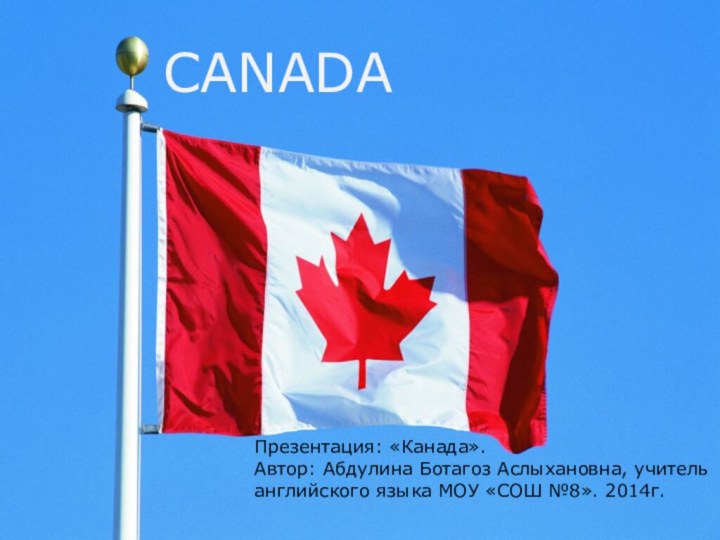
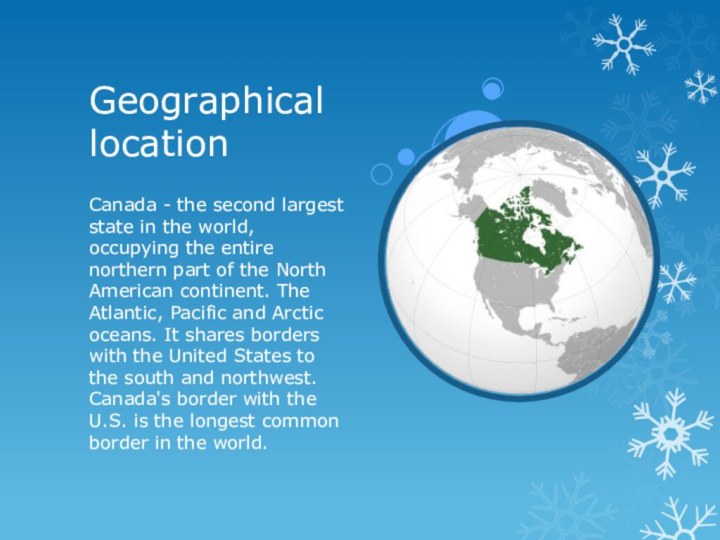
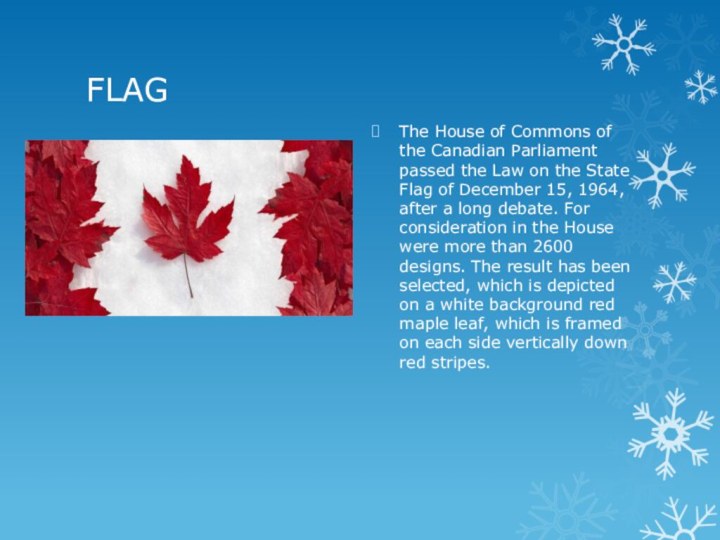
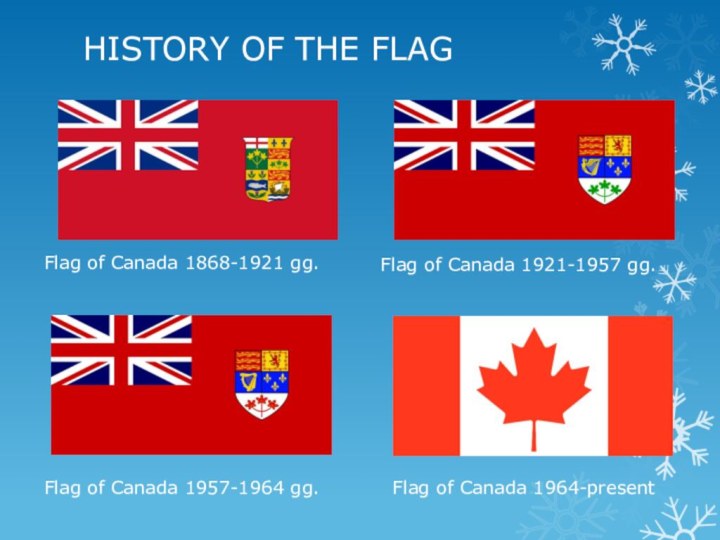
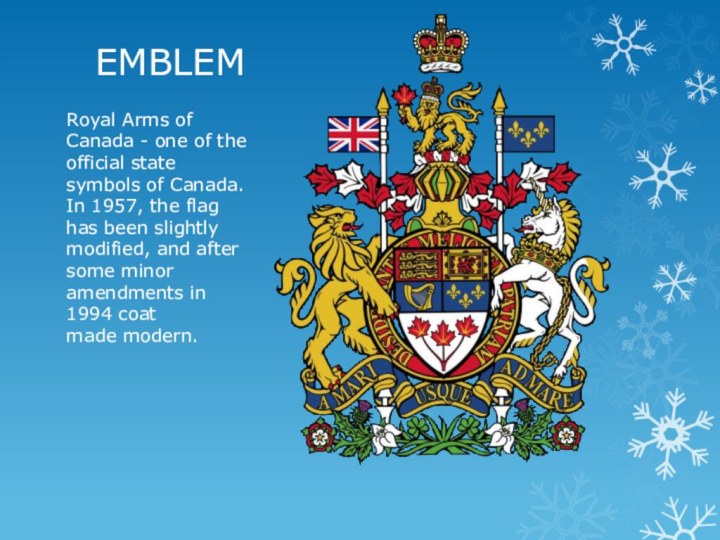
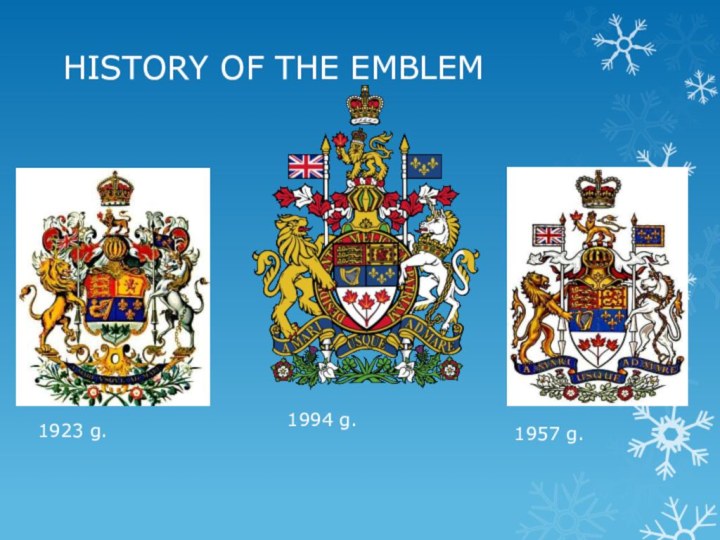

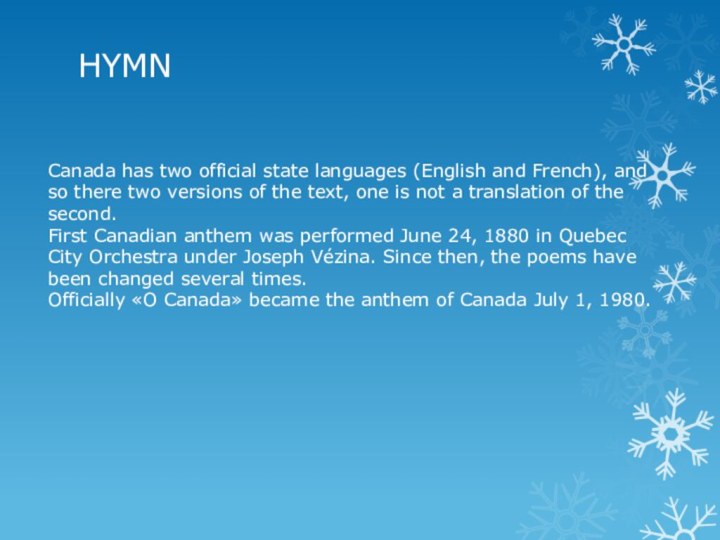
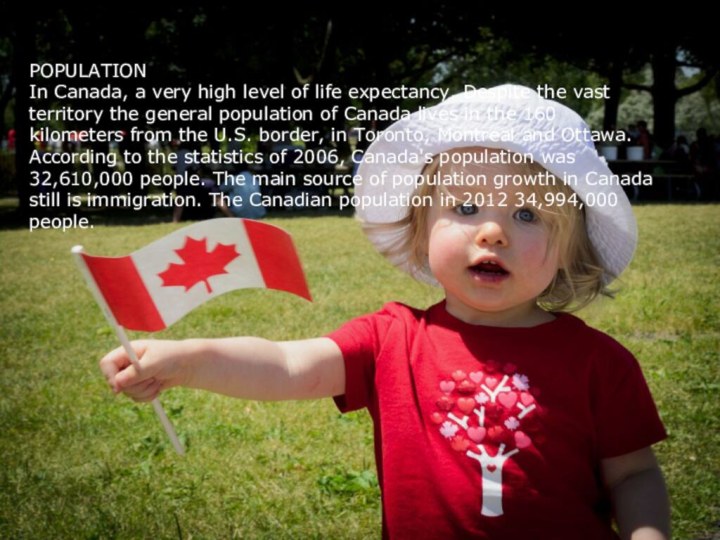

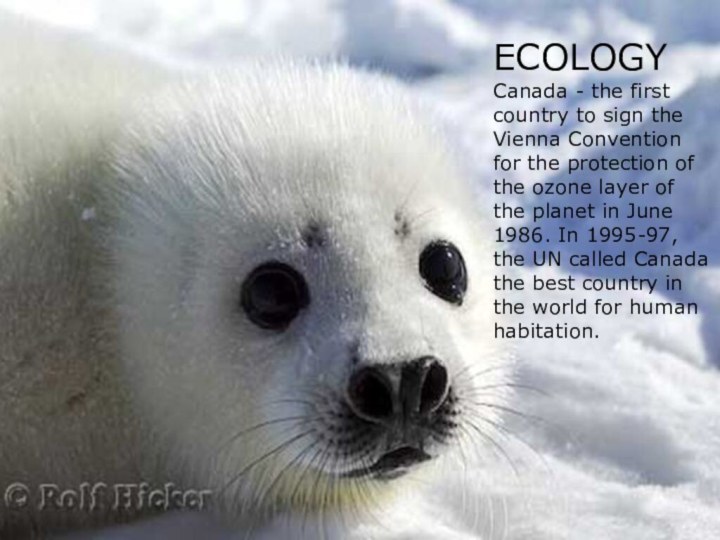
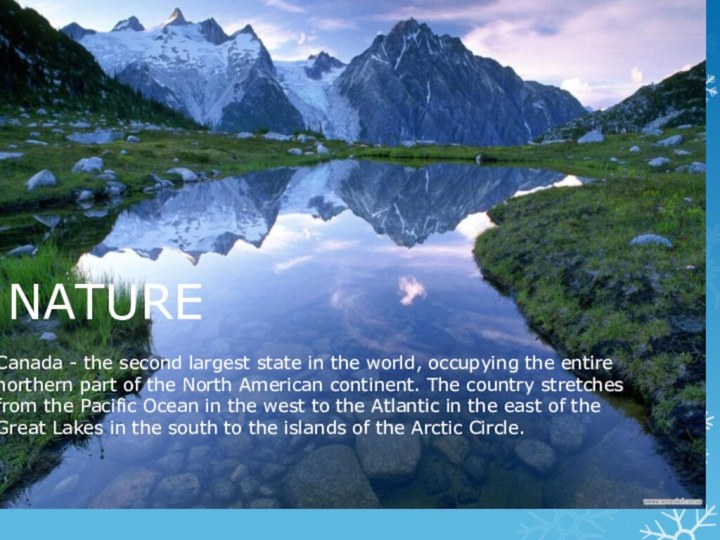
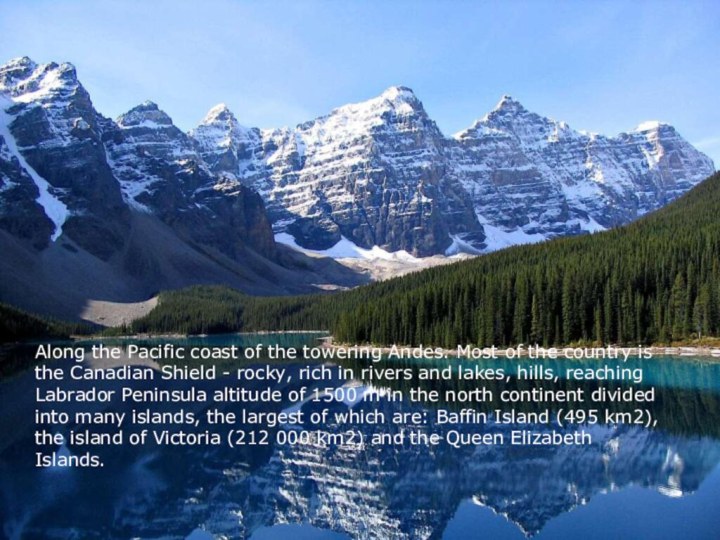
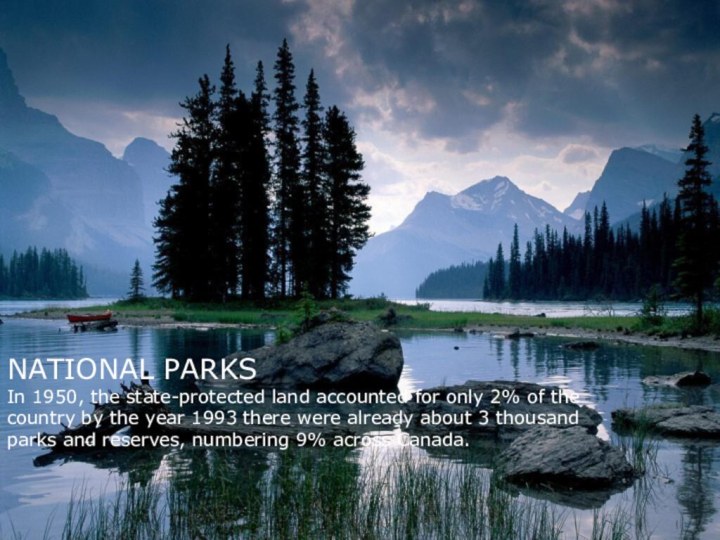
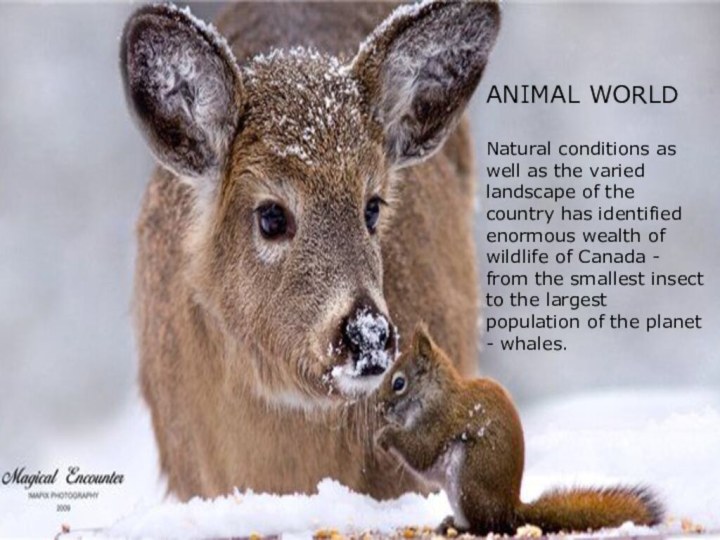
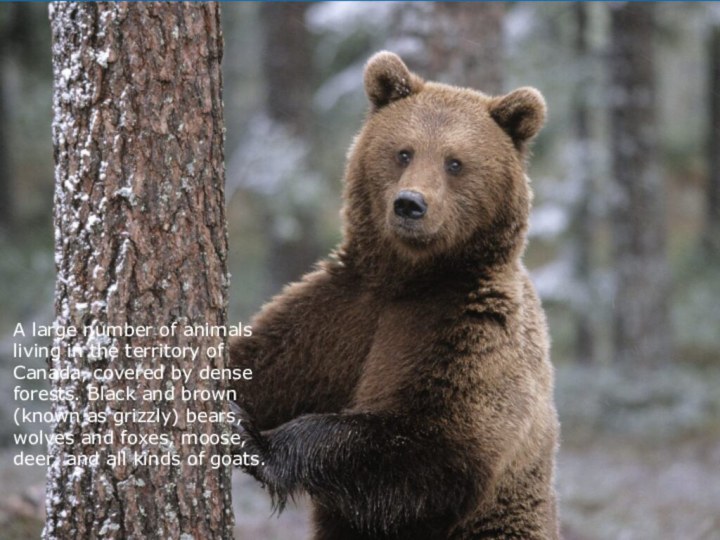

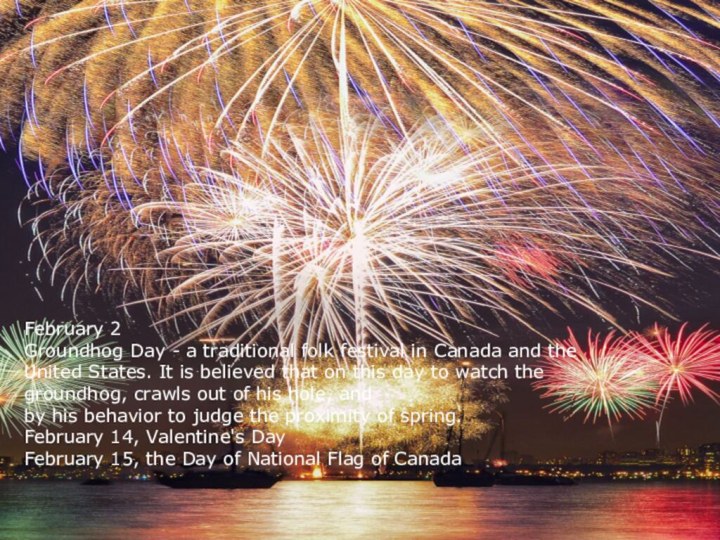
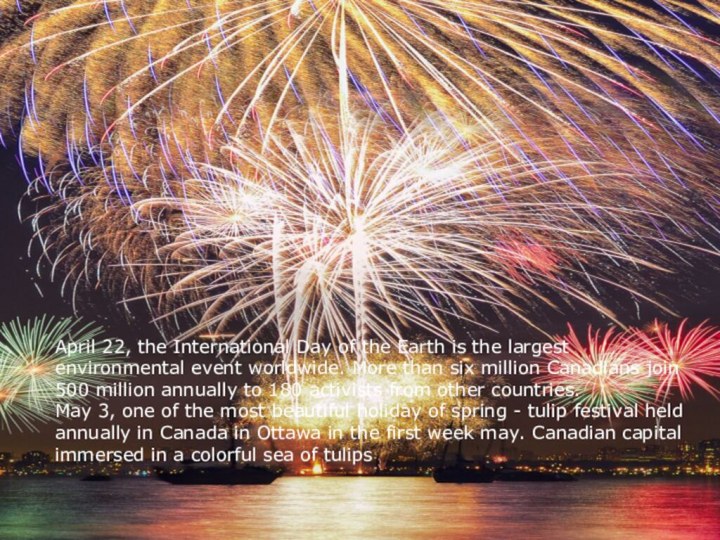

Слайд 3
FLAG
The House of Commons of the Canadian Parliament
passed the Law on the State Flag of December
15, 1964, after a long debate. For consideration in the House were more than 2600 designs. The result has been selected, which is depicted on a white background red maple leaf, which is framed on each side vertically down red stripes.
Слайд 4
HISTORY OF THE FLAG
Flag of Canada 1868-1921 gg.
Flag
of Canada 1921-1957 gg.
Flag of Canada 1957-1964 gg.
Flag of
Canada 1964-present
Слайд 5
EMBLEM
Royal Arms of Canada - one of the
official state symbols of Canada.
In 1957, the flag has
been slightly modified, and after some minor amendments in 1994 coat made modern.Слайд 7 Crown-this variant was passed in 1957 at the
initiative of Elizabeth II to replace the old version
of 1921, which represented a Tudor crown.Shield-The four parts represent the country, the ancestors of which came Canadians.
Tape
Shield surrounds the band with a Latin inscription ("They want the best of the country").This item has been added to the Queen in 1987g.
Supporters
Support unit rampant English lion and Scottish unicorn (figures taken from the arms of the UK). Lion and unicorn kept flagpoles with royal flags of Britain and France.
Слайд 8
HYMN
Canada has two official state languages (English and
French), and so there two versions of the text,
one is not a translation of the second.First Canadian anthem was performed June 24, 1880 in Quebec City Orchestra under Joseph Vézina. Since then, the poems have been changed several times.
Officially «O Canada» became the anthem of Canada July 1, 1980.
Слайд 9 POPULATION In Canada, a very high level of life
expectancy. Despite the vast territory the general population of
Canada lives in the 160 kilometers from the U.S. border, in Toronto, Montreal and Ottawa. According to the statistics of 2006, Canada's population was 32,610,000 people. The main source of population growth in Canada still is immigration. The Canadian population in 2012 34,994,000 people.
Слайд 10
Education
Education in Canada is considered one of the
best in the world. To study in Canada spends
more than any other power "Big Eight." As a result, Canada is a world record for the number of students per 100 thousand inhabitants.Education in Canada is on the solid foundation of the British. The same system of degrees, the same approaches and techniques. Therefore diploma issued in Canada. opens opportunities to work in almost any country including the USA and the UK.
Слайд 11
ECOLOGY
Canada - the first country to sign the
Vienna Convention for the protection of the ozone layer
of the planet in June 1986. In 1995-97, the UN called Canada the best country in the world for human habitation.
Слайд 12
NATURE
Canada - the second largest state in the
world, occupying the entire northern part of the North
American continent. The country stretches from the Pacific Ocean in the west to the Atlantic in the east of the Great Lakes in the south to the islands of the Arctic Circle.Слайд 13 Along the Pacific coast of the towering Andes.
Most of the country is the Canadian Shield -
rocky, rich in rivers and lakes, hills, reaching Labrador Peninsula altitude of 1500 m in the north continent divided into many islands, the largest of which are: Baffin Island (495 km2), the island of Victoria (212 000 km2) and the Queen Elizabeth Islands.
Слайд 14
NATIONAL PARKS
In 1950, the state-protected land accounted for
only 2% of the country by the year 1993
there were already about 3 thousand parks and reserves, numbering 9% across Canada.
Слайд 15
ANIMAL WORLD
Natural conditions as well as the varied
landscape of the country has identified enormous wealth of
wildlife of Canada - from the smallest insect to the largest population of the planet - whales.Слайд 16 A large number of animals living in the
territory of Canada, covered by dense forests. Black and
brown (known as grizzly) bears, wolves and foxes, moose, deer, and all kinds of goats.
Слайд 17
Holidays
January 1
New Year - a holiday that the
Russian people is perhaps the most beloved, - in
Canada is not marked as magnificently. InNew Year night at home amazingly calm, in Canada this holiday, few deal with, and if someone is celebrating, then quietly and not until morning.
Слайд 18
February 2
Groundhog Day - a traditional folk festival
in Canada and the United States. It is believed
that on this day to watch the groundhog, crawls out of his hole, andby his behavior to judge the proximity of spring.
February 14, Valentine's Day
February 15, the Day of National Flag of Canada
Слайд 19 April 22, the International Day of the Earth
is the largest environmental event worldwide. More than six
million Canadians join 500 million annually to 180 activists from other countries.May 3, one of the most beautiful holiday of spring - tulip festival held annually in Canada in Ottawa in the first week may. Сanadian capital immersed in a colorful sea of tulips







